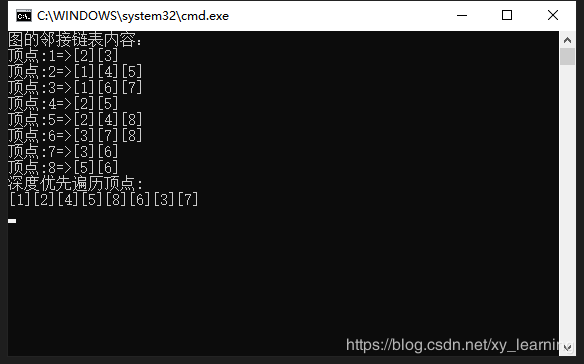C#图与图的算法之深度优先遍历
关于图与图的算法,应该这样去学习:
1.应该从图的概念讲起,例如无向图和有向图等,明白图是什么,能够表示哪些实际问题。
2.学习图应该用怎样的数据结构去表示,这里就会学到邻接矩阵法和邻接链表法等数据结构,比较两种数据结构的优劣,在后面的算法学习中会用到。
3.学习图的基础算法:基础的同样是最重要的,包括:深度优先遍历,广度优先遍历和拓扑排序等。
4.学习图的一些高级算法(后面会陆续介绍)。
这里简单介绍一下深度优先遍历。
1.什么是深度优先的遍历?
举个例子:你有4个瓜ABCD,每个瓜之间都有藤蔓缠着,你打算顺着这个藤怎么去摸瓜?例如,现在有A瓜在手里,A和BC都连接着,B和CD也连接着,如果是广度优先,那么找完A接着就会去找与其相连的B和C,如果是深度优先,那么找完A就会找B,然后接着找B下面的C和D,然后接着找C(或者D)下面的瓜。
所以深度优先就是沿着纵深的角度,只要有新的没有找过的点,我就去把它找出来,想到这里你是否已经联想到,这就类似二叉树的递归遍历,只要子树还有节点没有访问,那么就先访问子树节点。那么,其实广度优先遍历就像二叉树遍历中的层序遍历,依次输出该节点的所有子节点。
如果还不太明白,请看代码,这里有详细的注释:
using System;
using System.Collections.Generic;
using System.Linq;
using System.Text;
using System.Threading.Tasks;
using static System.Console;
namespace 图的遍历__深度优先遍历
{
//这里图的数据结构采用邻接链表法
class Node
{
//每一个顶点的表示
public int x;
public Node next;
public Node(int x)
{
this.x = x;
this.next = null;
}
}
class GraphLink
{
//每一个邻接链表的表示
//就是一个简单的单链表
public Node first;
public Node last;
public bool Isempty()
{
return first == null;
}
public void Print()
{
Node current = first;
while (current != null)
{
Write("[" + current.x + "]");
current = current.next;
}
}
public void Insert(int x)
{
//在当前链表中插入节点
Node newnode = new Node(x);
if (this.Isempty())
{
first = newnode;
last = newnode;
}
else
{
last.next = newnode;
last = newnode;
}
}
}
class Program
{
public static int[] run = new int[9];
public static GraphLink[] head = new GraphLink[9];
public static void DFS(int current)
{
///
///深度优先遍历(DFS)的算法
///
//run是每个节点的数组,1~8,用1表示该节点已经访问过
run[current] = 1;
Write("[" + current + "]");
while ((head[current].first) != null)
{
//如果该节点所指的下一个节点未被访问,那么就递归访问该节点
if (run[head[current].first.x] == 0)
{
DFS(head[current].first.x);
}
//进行到这里说明深度已经到底了,开始往回找了
head[current].first = head[current].first.next;
}
}
static void Main(string[] args)
{
//1~8这八个节点之间的联系关系
int[,] Data = { { 1, 2 }, { 2, 1 }, { 1, 3 }, { 3, 1 }, { 2,4},
{ 4,2},{ 2,5},{ 5,2},{ 3,6},{ 6,3},
{ 3,7},{ 7,3},{ 4,5},{ 5,4},{ 6,7},
{7,6},{ 5,8},{ 8,5},{ 6,8},{ 8,6} };
int i, j;
WriteLine("图的邻接链表内容:");
for (i = 1; i < 9; i++)
{
//每个顶点初始化为0,表示未访问过
run[i] = 0;
head[i] = new GraphLink();
Write("顶点:" + i + "=>");
for (j = 0; j < 20; j++)
{
if (Data[j, 0] == i)
{
head[i].Insert(Data[j, 1]);
}
}
head[i].Print();
WriteLine();
}
WriteLine("深度优先遍历顶点:");
DFS(1);
WriteLine();
ReadKey();
}
}
}
对照看输出结果:
